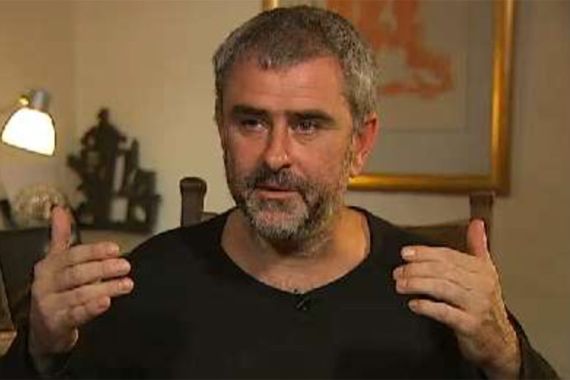British reporter tells of time in Syrian jail
Journalist with London-based broadcaster tells of arrest and interrogation last week while on assignment in Damascus.

 |
|
Filmmaker Sean McAllister was arrested last week in a Damascus cafe and interrogated in a Syrian prison [Channel 4] A British journalist detained in Syria last week has described his interrogation at the hands of government officials and given a vivid account of the punishments meted out to other inmates. Sean McAllister of London-based Channel 4 News was arrested at a Damascus cafe while working on a report on the country’s anti-government uprising, which the United Nations claims has left more than 3,000 protesters dead. McAllister said he and a Syrian journalist named Jihad were seized at the restaurant by police who blindfolded them and drove them to a prison in the capital. He did not disclose how long he was held in detention. Channel 4 said McAllister’s account “reveals an insight into how dissent is handled amidst the ongoing rebellion and he speaks of his fears for those Syrians who had assisted him – they are now targets for the regime”. ‘Wailing painfully’ “I was placed on a seat in an empty room on my own,” McAllister said. “Outside I could hear beatings in a neighbouring room. People being slapped and wailing painfully as they were being whacked.” He also detailed how his fellow prisoners, mostly activists and protesters, were treated by security forces. “When they are taken out of the cell they are blindfolded and their hands are tied. They are taken down the corridor to this, well, they don’t know where they are going, the whole thing, having been blindfolded for a little bit, the disorientation, of never seeing and the person you keep meeting is just a voice that you hear and you have to see him on one knee, you are forced to kneel on one knee. It’s a very awkward position to be in for maybe an hour of interrogation. “If they are not satisfied with the info, you would be brought out at three in the morning into the torture chamber and whipped with the cable or there was like a hundred leather belts like a big ball of leather belts in the corner.” ‘Too brave’ McAllister continued: “I’d seen these things that they’d use, because the cable was next to my bed one night… It was so heavy, it was so awful, it must have broken bones. And the howling, the noise of a human being hit with that is something that just, you know, you shiver and shake. “You hear a sound that you’ve never heard before. I’ve never heard before. And I’ve seen people dead. And I’ve seen people dying. And I’ve seen people decapitated, but this sound hearing a man cry, is just like, awful, there’s nothing to compare it with.” His time in Syrian custody, though much shorter, drew parallels with the experiences of Al Jazeera’s Dorothy Parvaz, who described her surroundings in Syria as a “mini-Guantanamo” maintained by cruel and paranoid overseers. Parvaz was detained by Syrian authorities after entering the country on April 29 and deported to Iran after several days. McAllister was struck by the bravery of fellow prisoners. He said he had received no information about his friend, Jihad, who was arrested with him. “I didn’t realise exactly what those guys are risking until I went into that experience and, my God, those guys are brave. Too brave. “The voice I got from [protest hub] Homs is that we just need help. We need outside help. We need foreign intervention. We need a no fly zone. We will take any of those options to move thing things forward, because they are killing us every day”. |